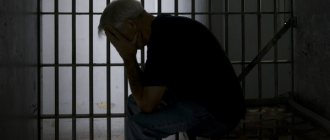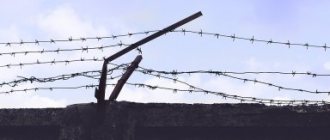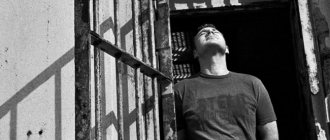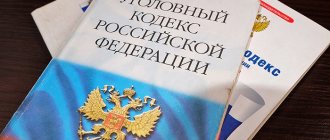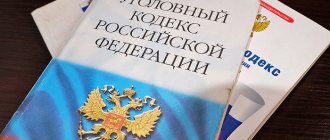ST 92 of the Criminal Code of the Russian Federation.
1. A minor convicted of committing a crime of minor or medium gravity may be released by the court from punishment using compulsory educational measures provided for in part two of Article 90 of this Code.
2. A minor sentenced to imprisonment for committing a crime of average gravity, as well as a serious crime, may be released by the court from punishment and placed in a special closed educational institution. Placement in a special closed educational institution is used as a compulsory measure of educational influence in order to correct a minor who needs special conditions of upbringing, training and requires a special pedagogical approach. A minor may be placed in the specified institution until he reaches the age of eighteen, but for no more than three years.
3. The stay of a minor in a special closed-type educational institution shall be terminated before the expiration of the period established by the court, if the court finds that the minor no longer needs to apply this measure, or if he is diagnosed with a disease that prevents his maintenance and training in the specified institution .
4. The court has the right to restore the period of stay of a minor in a special closed-type educational institution, missed as a result of his evasion from staying in the specified institution, and also extend the period of stay of a minor in a special closed-type educational institution after the expiration of the period established by the court, in if the court finds that the minor needs further application of this measure. In this case, the total period of stay of a minor in this institution cannot exceed three years. If it is necessary for a minor to complete mastery of relevant educational programs or to complete vocational training, an extension of his stay in a special closed-type educational institution is allowed only at the request of the minor.
5. Minors who have committed crimes provided for in parts one and two of Article 111, part two of Article 117, part three of Article 122, part one of Article 126, part three of Article 127, part two of Article 131, part two of Article 132, part four of Article 158, part two of Article 161, parts one and two of Article 162, part two of Article 163, part one of Article 205.1, article 205.2, part two of Article 205.4, part one of Article 206, part two of Article 208, part two of Article 210, part one of Article 211, Parts two and three of Article 223, parts one and two of Article 226, part one of Article 228.1, parts one and two of Article 229, Article 360 of this Code are not subject to exemption from punishment in the manner prescribed by part two of this article.
Commentary to Art. 92 Criminal Code
1. The article under comment provides for special types of release of a minor from punishment: a) release from punishment using compulsory educational measures (Part 1 of Article 92 of the Criminal Code); b) release from punishment with placement in a special closed educational institution of the education management body (Part 2 of Article 92 of the Criminal Code).
Both types of release of a minor from punishment in accordance with Art. 92 of the Criminal Code are unconditional, i.e. such release cannot subsequently be revoked. In accordance with Part 2 of Art. 86 of the Criminal Code, a minor exempted from punishment under Art. 92 of the Criminal Code, is considered not convicted.
2. The placement of a minor in a special closed-type educational institution of the educational management body is used for the purpose of correcting a minor who needs special conditions of upbringing, training and requires a special pedagogical approach. Special closed-type educational institutions of educational authorities include: a) closed-type special general education schools; b) special closed vocational schools; c) closed special (correctional) educational institutions.
Everything about criminal cases
Go to the Criminal Code
Url Additional information:
- Part 1 92 of the Criminal Code
if it is of moderate severity, then instead of punishment the measures from
Part 2 90 of the Criminal Code
Closed institution
- part 2 92 of the Criminal Code
if serious, then instead of punishment, a closed institution
- part 2 92 of the Criminal Code
until the age of 18, but not more than 3 years
Early release
- Part 3 92 of the Criminal Code
if there is no need to apply this measure
- Part 3 92 of the Criminal Code
if there is a disease that prevents the maintenance
Extension
- part 4 92 of the Criminal Code
if you evade, the time limit is restored
- part 4 92 of the Criminal Code
extension if further use is needed
- part 4 92 of the Criminal Code
total stay no more than 3 years
- part 4 92 of the Criminal Code
extension to complete studies only upon application
Not applicable
- part 5 92 of the Criminal Code
exemption under
Part 2 of 92 of the Criminal Code
does not apply to a number of articles of the Criminal Code
Article 92 of the Criminal Code. Exemption from punishment of minors
Url Additional information:
-
P . 31
Plenum No. 1 educational measures: instead of punishment
1) A minor convicted of committing a crime of minor or moderate gravity may be released by the court from punishment using compulsory educational measures provided for in Part 2 90 of the Criminal Code.
2) A minor sentenced to imprisonment for committing a crime of medium gravity, as well as a serious crime, may be released by the court from punishment and placed in a special closed educational institution. Placement in a special closed educational institution is used as a compulsory measure of educational influence in order to correct a minor who needs special conditions of upbringing, training and requires a special pedagogical approach.
A minor may be placed in the specified institution until he reaches the age of 18, but for no more than 3 years.
3) The stay of a minor in a special closed educational institution is terminated before the expiration of the period established by the court:
- if the court finds that the minor no longer needs to apply this measure,
- or if he is diagnosed with a disease that prevents his maintenance and training in the specified institution.
4)
The court has the right :
- to restore the period of stay of a minor in a special closed-type educational institution, missed as a result of his evasion from staying in the specified institution,
— and also extend the period of stay of a minor in a special closed-type educational institution after the expiration of the period established by the court, if the court finds that the minor needs further application of this measure.
In this case, the total period of stay of a minor in this institution cannot exceed 3 years.
If it is necessary for a minor to complete mastery of relevant educational programs or to complete vocational training, an extension of his stay in a special closed-type educational institution is allowed only at the request of the minor.
5) Minors who have committed crimes provided for by:
Part 1- Part 2 111, Part 2 117, Part 3 122, Part 1 126, Part 3 127, Part 2 131, Part 2 132, Part 4 158, Part 2 161, Part .1 - part 2 162, part 2 163, part 1 205, part 1 - part 2 205.1, 205.2, part 2 205.4, part 2 205.5, part 1 206, part 2 208, part .2 210, part 1 211, part 2 - part 3 223, part 1 - part 2 226, part 1 228.1, part 1 - part 2 229, 360 of the Criminal Code.
Return to the Criminal Code
Seek advice
Second commentary to Art. 92 of the Criminal Code of the Russian Federation
1. The conditions for the release of minors from punishment with the use of compulsory educational measures are identical to those provided for in Part 1 of Art. 90 of the Criminal Code - commission of a crime of minor or medium gravity. In the text of Part 1 of Art. 92 of the Criminal Code there is no provision on the basis for exemption from punishment, which is the court’s conclusion about the possibility of correcting the convicted person through the use of compulsory educational measures. However, this does not relieve the court from resolving this issue when releasing a minor from punishment in accordance with Part 1 of Art. 92 of the Criminal Code. Minors convicted of crimes of minor or moderate gravity are subject to such educational measures as are provided for in part two of Article 90 of the Criminal Code. In this case, the court makes a guilty verdict without imposing punishment.
2. If a minor is sentenced to imprisonment for committing a crime of medium gravity, as well as a serious crime, the court has the right, on the basis of Part 2 of Art. 92 of the Criminal Code of the Russian Federation, with the exception of persons listed in Part 5 of Art. 92 of the Criminal Code of the Russian Federation, release him from punishment and place him in a special closed educational institution of the education management body. Such a decision is made in order to replace the deprivation of liberty assigned to a minor with another type of punishment (clause 35 of the Resolution of the Plenum of the Supreme Court of the Russian Federation dated 01.02.2011 No. 1).
Release from punishment in the form of imprisonment imposed on a minor for committing a crime of average gravity, as well as a serious crime, with his placement in a specialized closed educational institution as a compulsory measure of educational influence can be carried out by the court and later in the execution of the sentence (clause 16, Article 397 of the Code of Criminal Procedure of the Russian Federation).
3. Minor convicts who need special conditions of education and training and require a special pedagogical approach are sent to a special closed-type educational institution. The issue of sending a convicted minor to a special closed-type educational institution of the educational management body can be decided by the court only if there is a medical report on the possibility of his stay in such an institution.
4. The duration of the compulsory educational measure does not depend on the period of punishment provided for by the sanction of the article of the Criminal Code under which the minor’s act is qualified. A minor can be placed in the specified institution only until he reaches 18 years of age and for no more than 3 years.
The stay of a minor in a special institution may be terminated before the expiration of the period established by the court if it is recognized that the minor no longer needs to apply this educational measure or if he is diagnosed with a disease that prevents his stay and education in this institution.
The period of stay in a specialized closed institution, missed as a result of a minor’s evasion from serving this measure, can be restored by the court or extended if the court comes to the conclusion that the minor needs further educational influence. In this case, the total period of stay of a minor in a special closed educational institution cannot exceed three years. At the request of a minor, his period of stay in the specified institution may be extended if necessary to complete educational programs or vocational training.
Article 92 of the Criminal Code of the Russian Federation. Exemption from punishment for minors (current version)
1. A minor convicted of committing a crime of minor or medium gravity may be released by the court from punishment using compulsory educational measures provided for in part two of Article 90 of this Code.
2. A minor sentenced to imprisonment for committing a crime of average gravity, as well as a serious crime, may be released by the court from punishment and placed in a special closed educational institution. Placement in a special closed educational institution is used as a compulsory measure of educational influence in order to correct a minor who needs special conditions of upbringing, training and requires a special pedagogical approach. A minor may be placed in the specified institution until he reaches the age of eighteen, but for no more than three years.
3. The stay of a minor in a special closed-type educational institution shall be terminated before the expiration of the period established by the court, if the court finds that the minor no longer needs to apply this measure, or if he is diagnosed with a disease that prevents his maintenance and training in the specified institution .
4. The court has the right to restore the period of stay of a minor in a special closed-type educational institution, missed as a result of his evasion from staying in the specified institution, and also extend the period of stay of a minor in a special closed-type educational institution after the expiration of the period established by the court, in if the court finds that the minor needs further application of this measure. In this case, the total period of stay of a minor in this institution cannot exceed three years. If it is necessary for a minor to complete mastery of relevant educational programs or to complete vocational training, an extension of his stay in a special closed-type educational institution is allowed only at the request of the minor.
5. Minors who have committed crimes provided for in parts one and two of Article 111, part two of Article 117, part three of Article 122, part one of Article 126, part three of Article 127, part two of Article 131, part two of Article 132, part four of Article 158, part two of Article 161, parts one and two of Article 162, part two of Article 163, part one of Article 205.1, article 205.2, part two of Article 205.4, part one of Article 206, part two of Article 208, part two of Article 210, part one of Article 211, Parts two and three of Article 223, parts one and two of Article 226, part one of Article 228.1, parts one and two of Article 229, Article 360 of this Code are not subject to exemption from punishment in the manner prescribed by part two of this article.
Third commentary to Article 92 of the Criminal Code of the Russian Federation
1. In fact, this norm deals with the grounds and conditions for the release of minors from punishment, including their placement in a special closed educational institution of the educational authority.
2. It follows from the law that: firstly, the court can release a minor convicted of a crime of minor or moderate gravity from punishment using general compulsory measures of educational influence (Part 2 of Article 90 of the Criminal Code); secondly, release from punishment is possible with placement in a special closed-type educational institution of an educational management body, but this measure is considered as a specific type of compulsory educational measures and is applied only by the court in order to replace the punishment of a minor when he is convicted of a crime of average gravity, as well as a serious crime; the maximum period of its application does not depend on the maximum punishment provided for by the Criminal Code for a crime committed by a teenager, and is three years; thirdly, the law contains an exhaustive list (Part 5 of Article 92 of the Criminal Code) of crimes for the commission of which this type of exemption from punishment is not applied. We believe that such a decision is completely justified and will allow us to distinguish between minors who have committed very dangerous crimes.
3. The court is given the right to shorten the period of stay of a minor in these institutions or extend it if it is necessary for the teenager to complete general educational or professional training.
The analyzed article of the Criminal Code clearly outlines the grounds on which the period of stay of a minor in a special educational (closed type) or medical educational institution can be prematurely terminated and extended. ‹ Article 91. Contents of compulsory educational measuresUp Article 93. Conditional early release from serving a sentence ›

